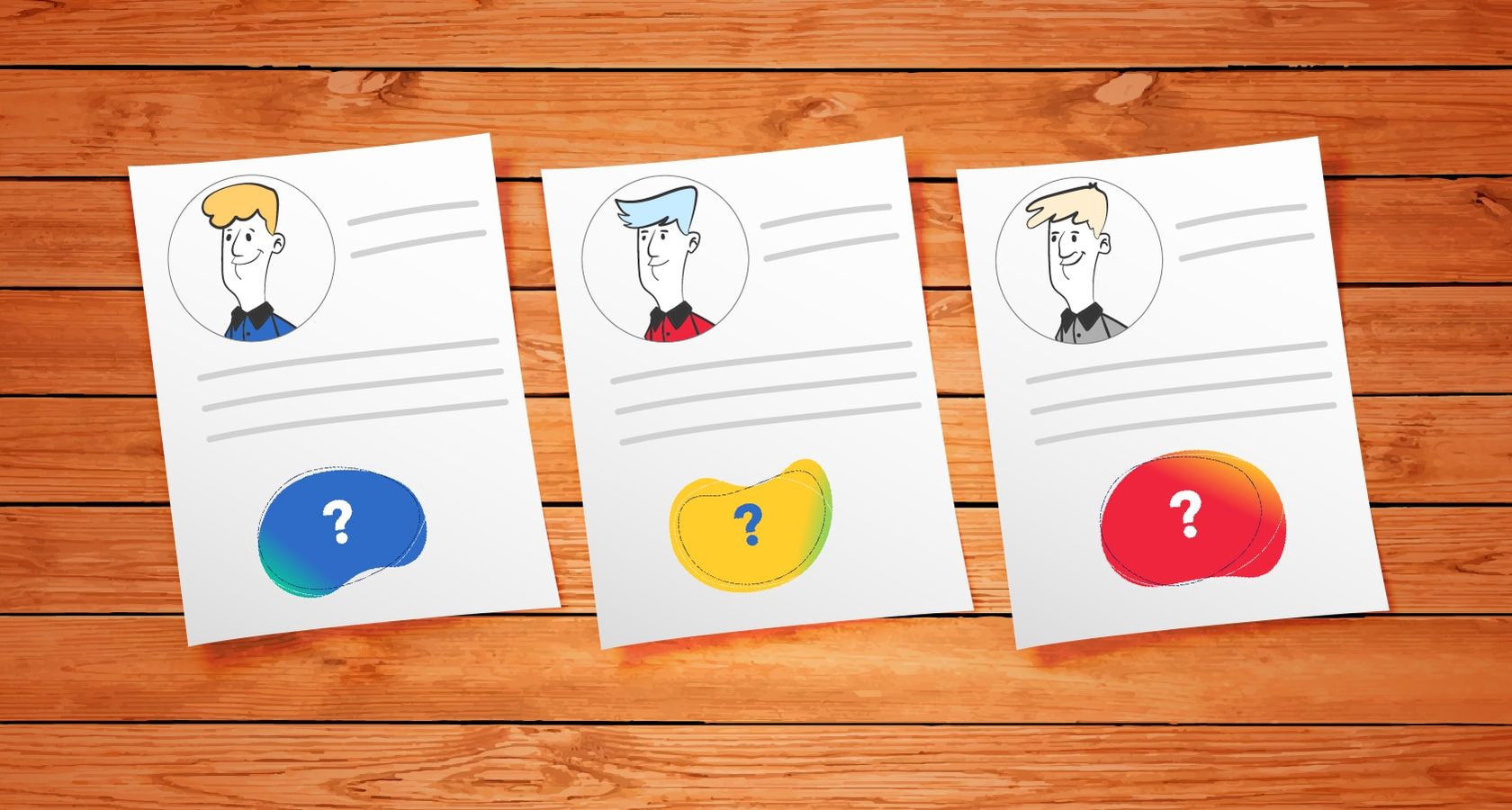Stay tuned for the latest FinTech news with goblog
Subscribe to goblog and get useful articles about
FinTech innovations and managing your finances.
FinTech innovations and managing your finances.
Your data is always safe with us. By clicking the button you agree our
Join the waitlist
Be the first to get all benefits of a new fair credit score
Your data is always safe with us. By clicking the button you agree our
Meld på ventelisten
Vær den første som får alle fordelene ved en ny rettferdig kreditt score
Your data is always safe with us. By clicking the button you agree our
8 tips: what to do if you have no credit history?


6 min read
29.08.2019
Tips&Tricks

by Max
This practical article helps you find out:
- what a credit history is;
- what to do if you have no credit history;
- what you shouldn't do when you have no credit history;
- 8 simple steps for building a good credit history.
- what a credit history is;
- what to do if you have no credit history;
- what you shouldn't do when you have no credit history;
- 8 simple steps for building a good credit history.
What is your credit history?
Whenever you make payments or repay your loan, you are working on building your credit history. Based on your credit history, credit reference agencies prepare your credit report. The longer the history of repaying loans and making payments on time, the better your «borrower profile» will look for the banks.
If you haven't received loans or used credit cards before, your credit history will be empty. For young people, a lack of credit history is logical, but the older a person without a credit history is, the more suspicious that person looks for the banks and lenders.
If you haven't received loans or used credit cards before, your credit history will be empty. For young people, a lack of credit history is logical, but the older a person without a credit history is, the more suspicious that person looks for the banks and lenders.
Unfair paradox: to get a loan, you must have a good credit history. To have a good credit history, you must have a loan.
Cases in which you may not have a credit history
There are several cases when people have no credit history but can manage their finances wisely.
1) Young people and students
Young people aged 18-19 typically have not gotten their first credit card yet. Therefore, their credit history will be blank.
2) Person with high family income
People may not use loans if they have enough money or funds of their own, for example, to buy a car or house.
3) Exchange students and people from other countries
People coming from other countries may have a credit history in their country, but in Norway, their credit history will be blank.
4) People who haven't used credit lines in the past few years
In this case, the old data on payments and loan repayments are not taken into account when preparing the credit report. And the credit history will also be blank.
5) A person has closed access to his credit report
Any person has the right to restrict third party access to receiving his credit report. In this case, CRAs will report this restriction, which may be perceived by banks and other companies as blank credit history.
6) Personal and Credit Fraud
Through illegal manipulation, a person was able to change his personal and passport data or erase his negative credit history.
(We warn that such actions are criminally punishable).
(We warn that such actions are criminally punishable).
1) Young people and students
Young people aged 18-19 typically have not gotten their first credit card yet. Therefore, their credit history will be blank.
2) Person with high family income
People may not use loans if they have enough money or funds of their own, for example, to buy a car or house.
3) Exchange students and people from other countries
People coming from other countries may have a credit history in their country, but in Norway, their credit history will be blank.
4) People who haven't used credit lines in the past few years
In this case, the old data on payments and loan repayments are not taken into account when preparing the credit report. And the credit history will also be blank.
5) A person has closed access to his credit report
Any person has the right to restrict third party access to receiving his credit report. In this case, CRAs will report this restriction, which may be perceived by banks and other companies as blank credit history.
6) Personal and Credit Fraud
Through illegal manipulation, a person was able to change his personal and passport data or erase his negative credit history.
(We warn that such actions are criminally punishable).
(We warn that such actions are criminally punishable).
1) Young people and students
Young people aged 18-19 typically have not gotten their first credit card yet. Therefore, their credit history will be blank.
2) Person with high family income
People may not use loans if they have enough money or funds of their own, for example, to buy a car or house.
3) Exchange students and people from other countries
People coming from other countries may have a credit history in their country, but in Norway, their credit history will be blank.
4) People who haven't used credit lines in the past few years
In this case, the old data on payments and loan repayments are not taken into account when preparing the credit report. And the credit history will also be blank.
5) A person has closed access to his credit report
Any person has the right to restrict third party access to receiving his credit report. In this case, CRAs will report this restriction, which may be perceived by banks and other companies as blank credit history.
6) Personal and Credit Fraud
Through illegal manipulation, a person was able to change his personal and passport data or erase his negative credit history.
(We warn that such actions are criminally punishable).
(We warn that such actions are criminally punishable).
So you can see that 5 out of 6 categories of people don't have a credit history but can be a financially responsible person.
What if you have no credit history
Lack of credit history can be interpreted by banks in two ways. On the one hand, you have no late payments or defaults. On the other hand, banks cannot trust large amounts of money to your empty «borrower profile». They don't know how you manage your finances and how you will repay loans.
The good news is that you have a great opportunity to start building your good credit history from scratch.
The good news is that you have a great opportunity to start building your good credit history from scratch.
You can read more about credit report in our article "What will you find in your credit report".
8 steps to building good credit history
First of all, you need to remember that lenders are not looking for a rich client, but a client who intelligently manages his money and pays his debts responsibly.
Therefore, be prepared for the fact that your first credit will not be the most profitable loan or largest amount of money.
We prepared 8 tips that help you develop a habitude of smartly managing your finances every day.
Therefore, be prepared for the fact that your first credit will not be the most profitable loan or largest amount of money.
We prepared 8 tips that help you develop a habitude of smartly managing your finances every day.
We want to draw your attention to the fact that not all tips are now used by credit agencies to calculate a credit score. For example, until July 1, 2019, there was no single credit register where the bank or CRA could see all your consumer loans. Therefore, the bank could see only those loans that you took in this bank. We expect that due to this innovation, credit agencies and banks will have more data for calculating the credit score soon.
Also, we noticed that "bad" financial management has a much stronger effect on your credit score than "good" behavior. In simple terms, calculating your credit score is like calculating your salary: if you fulfill all your work responsibilities, you get your salary. If you don't perform something (or violate), you receive only part of your salary (or pay a fine). So with the calculation of your credit score: the presence of serious violations affects your score much more than just a stable personal economy.
We understand that creating a credit history is not a matter of one month. That is why we prepared for you tips that will help you become a person who manages finances wisely and thinks about building his credit history in advance.
Also, we noticed that "bad" financial management has a much stronger effect on your credit score than "good" behavior. In simple terms, calculating your credit score is like calculating your salary: if you fulfill all your work responsibilities, you get your salary. If you don't perform something (or violate), you receive only part of your salary (or pay a fine). So with the calculation of your credit score: the presence of serious violations affects your score much more than just a stable personal economy.
We understand that creating a credit history is not a matter of one month. That is why we prepared for you tips that will help you become a person who manages finances wisely and thinks about building his credit history in advance.
1) "Small" credit card
You can apply for a small credit card without (or with low) requirements for income. With this card, you are unlikely to be able to pay for large purchases due to the small amount of credit.
Your main task: to use this card for small payments, pay your bills on time and leave a low card balance.
Your main task: to use this card for small payments, pay your bills on time and leave a low card balance.
2) Student credit lines
If you are a student, you can get a student loan. You will need to repay this loan after studying. So student years are a great start to manage your finances smartly.
3) Credit card for members of shops
If you often shop at a particular store or petrol station or you are a member of a club in a retail store, you can get a credit card from this store. Use this card each time when you make purchases at this shop and be sure that you pay your bills by the end of the month.
4) The first loan with a co-signer
You can get your first loan if you find a co-signer - a person with a high credit score who will guarantee the repayment of your loan if you can not repay it. Most often, co-signers are people who know you well and trust you: parents or close friends.
5) Authorized user to a joint account or credit card
Your parents or close friends with a good credit score and credit history can add you as an authorized user to their loan or credit card. By repaying your debt on time and keeping your credit card balances low, you earn a good credit reputation.
6) Always keep balances on your credit cards low
As soon as you get your first credit card, make sure that at the end of the month your credit card balance has more than 25-30%. Therefore, if you suddenly want to make a major purchase at the end of the month, check the balances and possibly transfer the payment to the beginning of the next month.
7) Don't apply for multiple credit cards at once
If you want to take a few loans, we recommend that you do it in stages. After receiving the first credit card, wait 6 months before applying for the second. Firstly, it will allow you to show timely payments within 6 months; secondly, you can get more favorable conditions for the next credit card.
8) Always pay all bills on time
This is the first rule you need to learn to build a good credit history. There are many convenient functions in financial apps that remind you about payments or allow you to make monthly auto-payments.
Therefore, think twice if you want to take another loan but doubt if you can repay the loan on time. It is better to review your existing credit lines, look for options for refinancing loans or early repayment of one of the loans.
Therefore, think twice if you want to take another loan but doubt if you can repay the loan on time. It is better to review your existing credit lines, look for options for refinancing loans or early repayment of one of the loans.
1) "Small" credit card
You can apply for a small credit card without (or with low) requirements for income. With this card, you are unlikely to be able to pay for large purchases due to the small amount of credit.
Your main task: to use this card for small payments, pay your bills on time and leave a low card balance.
Your main task: to use this card for small payments, pay your bills on time and leave a low card balance.
2) Student credit lines
If you are a student, you can get a student loan. You will need to repay this loan after studying. So student years are a great start to manage your finances smartly.
3) Credit card for members of shops
If you often shop at a particular store or petrol station or you are a member of a club in a retail store, you can get a credit card from this store. Use this card each time when you make purchases at this shop and be sure that you pay your bills by the end of the month.
4) The first loan with a co-signer
You can get your first loan if you find a co-signer - a person with a high credit score who will guarantee the repayment of your loan if you can not repay it. Most often, co-signers are people who know you well and trust you: parents or close friends.
5) Authorized user to a joint account or credit card
Your parents or close friends with a good credit score and credit history can add you as an authorized user to their loan or credit card. By repaying your debt on time and keeping your credit card balances low, you earn a good credit reputation.
6) Always keep balances on your credit cards low
As soon as you get your first credit card, make sure that at the end of the month your credit card balance has more than 25-30%. Therefore, if you suddenly want to make a major purchase at the end of the month, check the balances and possibly transfer the payment to the beginning of the next month.
7) Don't apply for multiple credit cards at once
If you want to take a few loans, we recommend that you do it in stages. After receiving the first credit card, wait 6 months before applying for the second. Firstly, it will allow you to show timely payments within 6 months; secondly, you can get more favorable conditions for the next credit card.
8) Always pay all bills on time
This is the first rule you need to learn to build a good credit history. There are many convenient functions in financial apps that remind you about payments or allow you to make monthly auto-payments.
Therefore, think twice if you want to take another loan but doubt if you can repay the loan on time. It is better to review your existing credit lines, look for options for refinancing loans or early repayment of one of the loans.
Therefore, think twice if you want to take another loan but doubt if you can repay the loan on time. It is better to review your existing credit lines, look for options for refinancing loans or early repayment of one of the loans.
1) "Small" credit card
You can apply for a small credit card without (or with low) requirements for income. With this card, you are unlikely to be able to pay for large purchases due to the small amount of credit.
Your main task: to use this card for small payments, pay your bills on time and leave a low card balance.
Your main task: to use this card for small payments, pay your bills on time and leave a low card balance.
2) Student credit lines
If you are a student, you can get a student loan. You will need to repay this loan after studying. So student years are a great start to manage your finances smartly.
3) Credit card for members of shops
If you often shop at a particular store or petrol station or you are a member of a club in a retail store, you can get a credit card from this store. Use this card each time when you make purchases at this shop and be sure that you pay your bills by the end of the month.
4) The first loan with a co-signer
You can get your first loan if you find a co-signer - a person with a high credit score who will guarantee the repayment of your loan if you can not repay it. Most often, co-signers are people who know you well and trust you: parents or close friends.
5) Authorized user to a joint account or credit card
Your parents or close friends with a good credit score and credit history can add you as an authorized user to their loan or credit card. By repaying your debt on time and keeping your credit card balances low, you earn a good credit reputation.
6) Always keep balances on your credit cards low
As soon as you get your first credit card, make sure that at the end of the month your credit card balance has more than 25-30%. Therefore, if you suddenly want to make a major purchase at the end of the month, check the balances and possibly transfer the payment to the beginning of the next month.
7) Don't apply for multiple credit cards at once
If you want to take a few loans, we recommend that you do it in stages. After receiving the first credit card, wait 6 months before applying for the second. Firstly, it will allow you to show timely payments within 6 months; secondly, you can get more favorable conditions for the next credit card.
8) Always pay all bills on time
This is the first rule you need to learn to build a good credit history. There are many convenient functions in financial apps that remind you about payments or allow you to make monthly auto-payments.
Therefore, think twice if you want to take another loan but doubt if you can repay the loan on time. It is better to review your existing credit lines, look for options for refinancing loans or early repayment of one of the loans.
Therefore, think twice if you want to take another loan but doubt if you can repay the loan on time. It is better to review your existing credit lines, look for options for refinancing loans or early repayment of one of the loans.
How we explain «credit history» to children

Imagine that you start to learn a new discipline at school.
Your teacher tells you that at the end of the year, the student with the best result will participate in the Olympiad.
So, on the first day, all students are equal in level of knowledge. If you want to attend the Olympiad, you start from the first lesson to demonstrate your interest and your desire to know this discipline perfectly. For example, you regularly do your homework, study additional material.
Your teacher tells you that at the end of the year, the student with the best result will participate in the Olympiad.
So, on the first day, all students are equal in level of knowledge. If you want to attend the Olympiad, you start from the first lesson to demonstrate your interest and your desire to know this discipline perfectly. For example, you regularly do your homework, study additional material.
And in a month you should be able to show that you understand this discipline much better than your classmates. Regular homework and responsible study will make you the best student by the end of the year.
Just as you work every day to study the discipline to become a better student, so your parents work every day to create a good credit history to get profitable loans in the future.
Just as you work every day to study the discipline to become a better student, so your parents work every day to create a good credit history to get profitable loans in the future.
And in a month you should be able to show that you understand this discipline much better than your classmates. Regular homework and responsible study will make you the best student by the end of the year.
Just as you work every day to study the discipline to become a better student, so your parents work every day to create a good credit history to get profitable loans in the future.
Just as you work every day to study the discipline to become a better student, so your parents work every day to create a good credit history to get profitable loans in the future.
Imagine that you start to learn a new discipline at school.
Your teacher tells you that at the end of the year, the student with the best result will participate in the Olympiad.
So, on the first day, all students are equal in level of knowledge. If you want to attend the Olympiad, you start from the first lesson to demonstrate your interest and your desire to know this discipline perfectly. For example, you regularly do your homework, study additional material.
Your teacher tells you that at the end of the year, the student with the best result will participate in the Olympiad.
So, on the first day, all students are equal in level of knowledge. If you want to attend the Olympiad, you start from the first lesson to demonstrate your interest and your desire to know this discipline perfectly. For example, you regularly do your homework, study additional material.


Imagine that you start to learn a new discipline at school.
Your teacher tells you that at the end of the year, the student with the best result will participate in the Olympiad.
So, on the first day, all students are equal in level of knowledge. If you want to attend the Olympiad, you start from the first lesson to demonstrate your interest and your desire to know this discipline perfectly. For example, you regularly do your homework, study additional material.
Your teacher tells you that at the end of the year, the student with the best result will participate in the Olympiad.
So, on the first day, all students are equal in level of knowledge. If you want to attend the Olympiad, you start from the first lesson to demonstrate your interest and your desire to know this discipline perfectly. For example, you regularly do your homework, study additional material.
And in a month you should be able to show that you understand this discipline much better than your classmates. Regular homework and responsible study will make you the best student by the end of the year.
Just as you work every day to study the discipline to become a better student, so your parents work every day to create a good credit history to get profitable loans in the future.
Just as you work every day to study the discipline to become a better student, so your parents work every day to create a good credit history to get profitable loans in the future.
Official sources
We have prepared a list of official sources from which you can learn more about credit scoring.
Datatilsynet - read about credit scoring.
Datatilsynet - current credit score regulations.
Datatilsynet - read about credit scoring.
Datatilsynet - current credit score regulations.
Summary
Whenever you make payments or repay your loan, you are working on building your credit history.
1
There are a few categories of people that don't have a credit history but can be a financially responsible person.
2
If you have no credit history you may start to build it from scratch with our 8 tips.
3



CEO @ Goscore
Maksim Hardziyenak
Education
Max has a bachelors degree in programming and mathematical methods and models. That's why he is not only an excellent developer but also an experienced Data Science and Machine Learning specialist.
Max holds an MSc degree in logistics and is currently working to obtain an MBA degree.
Job and experience
Max developed and taught his own IT course at the BSU (Belarus).
He has previously worked as a Senior Developer, Product Manager, CTO, and independent IT consultant.
Now Max applies all his accumulated experiences in the creation and development of Goscore.
What colleagues appreciate in Max
Colleagues appreciate Max's support, advice, and ability to analyze the situation from all sides and offer the best solution.
Hobby
His secret hobby is assembling realistic car models.
Max has a bachelors degree in programming and mathematical methods and models. That's why he is not only an excellent developer but also an experienced Data Science and Machine Learning specialist.
Max holds an MSc degree in logistics and is currently working to obtain an MBA degree.
Job and experience
Max developed and taught his own IT course at the BSU (Belarus).
He has previously worked as a Senior Developer, Product Manager, CTO, and independent IT consultant.
Now Max applies all his accumulated experiences in the creation and development of Goscore.
What colleagues appreciate in Max
Colleagues appreciate Max's support, advice, and ability to analyze the situation from all sides and offer the best solution.
Hobby
His secret hobby is assembling realistic car models.
Stay tuned for the latest fintech news with goblog
Subscribe to goblog and get useful articles about
fintech innovations and managing your finances.
fintech innovations and managing your finances.
Read more useful articles

6 min read
Academy

6 min read
Academy

5 min read
Tips&Tricks

